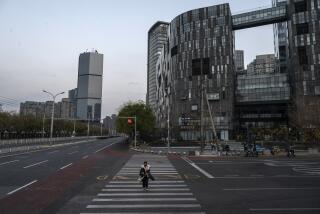Mammon Wins Out Over Marx as Chinese Youth Embrace New Heroes
- Share via
BEIJING — On the metal doors of the Workers’ Stadium where their heroes do battle, Beijing’s young scribble graffiti to proclaim their love for the city’s soccer team and its players.
“Guo’an team is great,” “Xie Chaoyang I love you,” “Love Forever” the kids declare in big, bold strokes of permanent marker.
So much for communist icons. In the battle for the hearts and minds of today’s Chinese, sports stars are winning out over proletarian heroes, and rock ‘n’ rollers have the edge on model workers.
China is embracing pop culture. Against the din of discos and Hollywood blockbusters, the ruling Communist Party is fighting to make itself heard.
Thirty years ago, young Chinese gathered by the million in Tian An Men Square to worship Chairman Mao. Today, a new generation clings to the wire fence surrounding the offices of the Guo’an soccer team, waiting for its stars to emerge.
When they do, the crowd erupts into screams: “Sign an autograph!” “Don’t run away!”
“These days kids, students, most admire sports stars and film stars,” said 16-year-old Huang Jianxiang, who waits outside the club most Fridays after school, hoping for autographs. “Everybody envies their lifestyles.”
Foreign movies and music, the Internet and e-mail, satellite TV and even state-run media are exposing young Chinese to cultures and behavior unimaginable in their parents’ youth. Some are just as familiar with Oasis and other pop groups, or as likely to want name-brand jeans and sneakers, as their Western counterparts.
“As far as Beijing kids are concerned, to be cool you have to listen to the Cranberries, the Smashing Pumpkins,” said Huang Feng, a disc jockey at Beijing’s Hard Rock Cafe. “Their No. 1 priority is to be cool.” With a smile, he added, “It’s corrupt Western influences.”
Deng Xiaoping, the late leader who engineered China’s shift to market economics, foresaw that his reforms would also open the way for unwanted Western influences or, as party officials put it, allow in flies with the fresh air.
Deng’s successors want to ensure that the flies don’t become a pestilence. Apparently worried by the power of popular culture and Western ideas, the party launched a “spiritual civilization” campaign last year stressing Chinese culture, civic responsibility, patriotism and other values communist elders fear are fading away.
Soldiers have been ordered to address each other as “comrade” more often. Even Lei Feng, a do-gooder soldier anointed one of the Communist Party’s most lauded heroes, has made a high-profile comeback, three decades after he was fatally hit on the head by a pole.
A new movie, “The Days Since Lei Feng Passed Away,” tells of the man who drove the truck that hit the pole that killed Lei, and his efforts to continue “Lei Feng’s spirit” of benevolence in today’s money-oriented China.
Official newspapers crowed that 470,000 people crowded Beijing theaters in the movie’s first 10 days in March.
Many, however, were workers from state-run enterprises and schoolchildren sent to see the movie on group tickets.
“I was really disgusted when our school organized us to see the movie,” said Huang, the soccer fan. “But actually it was quite good. Best political movie I’ve seen.”
The government has also sought to repress values it dislikes.
He Yong, a rock musician with flowing locks and a rebellious attitude, has been told he will not be able to perform for four years because he sang a song at a concert last November poking fun at Li Suli, an official model bus conductor.
He believes the government fears his irreverent brand of music and its popularity. He estimates that at least 1 million people heard his last album.
“That’s a lot of influence. That’s why they’re worried,” he said.
The government has also suppressed popular author Wang Shuo’s novels about prostitutes, gangsters and the disaffected.
But weaning young people from their new icons could be an uphill task.
A state-run newspaper reported that a school in northern China recently organized a screening of the revolutionary movie “Red Child” for 500 students. Within an hour, all but seven had walked out.
Some even pestered the projectionist to screen a Hong Kong movie, “Slimmers’ Tour Group,” instead, the newspaper said.
Their behavior, it added, “cannot but make people feel deeply disappointed.”
More to Read
Go beyond the scoreboard
Get the latest on L.A.'s teams in the daily Sports Report newsletter.
You may occasionally receive promotional content from the Los Angeles Times.










